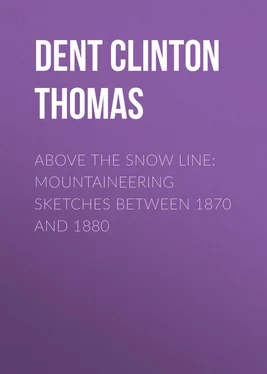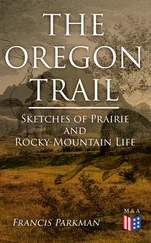Clinton Dent - Above the Snow Line - Mountaineering Sketches Between 1870 and 1880
Здесь есть возможность читать онлайн «Clinton Dent - Above the Snow Line - Mountaineering Sketches Between 1870 and 1880» — ознакомительный отрывок электронной книги совершенно бесплатно, а после прочтения отрывка купить полную версию. В некоторых случаях можно слушать аудио, скачать через торрент в формате fb2 и присутствует краткое содержание. Жанр: foreign_antique, foreign_prose, на английском языке. Описание произведения, (предисловие) а так же отзывы посетителей доступны на портале библиотеки ЛибКат.
- Название:Above the Snow Line: Mountaineering Sketches Between 1870 and 1880
- Автор:
- Жанр:
- Год:неизвестен
- ISBN:нет данных
- Рейтинг книги:4 / 5. Голосов: 1
-
Избранное:Добавить в избранное
- Отзывы:
-
Ваша оценка:
- 80
- 1
- 2
- 3
- 4
- 5
Above the Snow Line: Mountaineering Sketches Between 1870 and 1880: краткое содержание, описание и аннотация
Предлагаем к чтению аннотацию, описание, краткое содержание или предисловие (зависит от того, что написал сам автор книги «Above the Snow Line: Mountaineering Sketches Between 1870 and 1880»). Если вы не нашли необходимую информацию о книге — напишите в комментариях, мы постараемся отыскать её.
Above the Snow Line: Mountaineering Sketches Between 1870 and 1880 — читать онлайн ознакомительный отрывок
Ниже представлен текст книги, разбитый по страницам. Система сохранения места последней прочитанной страницы, позволяет с удобством читать онлайн бесплатно книгу «Above the Snow Line: Mountaineering Sketches Between 1870 and 1880», без необходимости каждый раз заново искать на чём Вы остановились. Поставьте закладку, и сможете в любой момент перейти на страницу, на которой закончили чтение.
Интервал:
Закладка:
The growth of the climbing craze
Time rolled on. The fascination of climbing spread abroad, and it followed with the increasing number of mountaineers that more and more difficulties were experienced in attempts to diversify the sport in the Alps alone, and in emerging from the common herd of climbers. Then a new danger arose. The sport grew fashionable – a serious symptom to its true lovers. Books of Alpine adventure readily found readers; novels, and other forms of nonsense, were written about the mountains; accounts of new expeditions were telegraphed at once to all parts of the world, and found as important a place in the newspapers as the Derby betting, or the latest reports as to the precise medical details of some eminent person’s internal complaint. Still further did the craving for novelty spread, and more strange did the means of satisfying it become. The mountains were ascended without guides: in winter; by people afflicted with mental aberration who wore tall hats and frock coats on the glaciers; by persons who were ignorant of the laws of optics as applied to large telescopes; in bad weather, by wrong routes and so forth. Then, too, set in what may be called the variation craze. This is very infectious. For those who can see no beauty in a scene that some one else has gazed on before it is still a passion. We may still at times, in the Alps, hear people say, “Oh yes, that is a very fine expedition, no doubt, but I don’t think I care much about undertaking it; you see so and so has done it; couldn’t we manage to strike out a different line?” The result is a “variation” expedition. The composer when hard driven, and not strongly under the influence of the Muse, will at times take some innocent, simple melody and submit it to exquisite torture by writing what he is pleased to call variations. Sometimes he will not rest till he has perpetrated as many as thirty-two on some innocent little tune of our childhood. The original air becomes entirely lost, like a sixpence buried in a flour bag, and we may marvel, for instance, as may the travelled American, at the immense amount of foreign matter that may be introduced into “Home, sweet home.” Even so does the climber sometimes practise his art. But for one who entertains a strict respect for the old order of things, and for the memory of an age of mountaineering now rapidly passing into oblivion, to write in any such strain would be intolerable. And so, even as a theatrical manager when his brilliant play, stolen, or, as it is generally described, “adapted,” from the French, does not run, I may be allowed to raise the curtain on a revival of the old drama, a comedy in one short act, and not provided with any very thrilling “situations.” The “scenarium” lay ready to hand in the leaves of an old journal, which may possibly share, with other old leaves, the property of being rather dry. But we are meandering, as it were, in the valleys, and run some risk of digressing too far from the path which should lead to the mountain in hand. There is a story of a clergyman who selected a rather long text as a preface to his discourse, and finding, when he had read it at length a second time, that his congregation were mostly disposed in attitudes which might be of attention, but which were, at the same time, suggestive of slumber, wisely concluded to defer enlarging upon it till a more fitting occasion, and dismissed his hearers, or at any rate those present, with the remark that they had heard his text and that he would not presume to mar its effectiveness by any exordium upon it. Revenons.
A tropical day in the valley
In the early part of August 1870, our party walked one sultry day up the Saas Valley. The dust glittered thick and yellow on our boots. Many of the smaller brooks had struck work altogether, while the main river was reduced to a clear stream trickling lazily down between sloping banks of rounded white boulders that shone with a painful glare in the strong sunlight. The more muscular of the grasshoppers found their limbs so lissom in the warmth that they achieved the most prodigious leaps out of sheer lightheartedness; for they sprang so far that they could have had no definite idea where they might chance to light. On the stone walls busy little lizards, with heaving flanks, scurried about with little fitful spurts, and vanished abruptly into the crannies, perpetually playing hide and seek with each other, and always seeming out of breath. The foliage drooped motionless in the heavy air and the shadows it cast lengthened along the dusty ground as steadily as the streak on a sundial. The smoke from the guides’ pipes (and guides, like itinerant nigger minstrels, always have pipes in their mouths when moving from the scene of one performance to another) hung in mid air, and the vile choking smell of the sputtering lucifer matches was perceptible when the laggards reached the spot where a man a hundred yards ahead had lighted one of these abominations.
To pass under the shade of a walnut tree was refreshing like a cold douche; and to step forth again into the heat and glare made one almost gasp. Flannel shirts were miserably inadequate to the strain put upon their absorbent qualities. The potatoes and cabbages were white and piteously dusty. Even the pumpkins seemed to be trying to bury their plump forms in the cool recesses of the earth. Everywhere there seemed a consciousness as of a heavy droning hum. All of which may be concisely summed up in the now classical opening remark of a well-known comedy character, one “Perkyn Middlewick” to wit, “It’s ’ot.”
A deserted hostelry
When within a little distance of the hotel I enquired whether it was worth while for one of the party to push on to secure rooms. The guides thought, on the whole, that it was unnecessary, and this opinion was justified subsequently by the fact that we found ourselves the sole occupants of the hotel during the week or so that we remained in the district. It was the year of the war; ugly rumours were about, but very few tourists. Selecting, therefore, the most luxurious apartment, and having given over to the care of one Franz, who appeared in the character of “boots” to the hotel, a remarkable pair of cowhide brogues of original design, as hard as sabots and much more uncomfortable, I sat down on a stone slab, in order to cool down to a temperature that might permit of dining without fear of imperilling digestion. So pleased were the hotel authorities at the presence of a traveller that they exerted themselves to the utmost to entertain us well, and with remarkable results. I find a record of the dinner served. There were ten dishes in consecutive order, exclusive of what Americans term “fixings.” As to the nature of nine it was difficult to speak with any degree of certainty, but the tenth was apparently a blackbird that had perished of starvation and whose attenuated form the chef had bulged out with extraneous matter. Franz, who seemed to be a sort of general utility man to the establishment, had thrown off, with the ease of a Gomersal or a Ducrow, the outward habiliments of a boots and appeared now as a waiter, in a shirt so hard and starched that he was unable to bend and could only button his waistcoat by the sense of touch. The repast over, Franz removed the shirt front and unbent thereupon in manner as in person. Assuming engaging airs, he entered into conversation, disappearing however for short intervals at times, in order, as might be inferred from certain sounds proceeding from an adjoining apartment, to discharge the duties of a chamber-maid. Subsequently it transpired that he was the proprietor of the hotel.
Читать дальшеИнтервал:
Закладка:
Похожие книги на «Above the Snow Line: Mountaineering Sketches Between 1870 and 1880»
Представляем Вашему вниманию похожие книги на «Above the Snow Line: Mountaineering Sketches Between 1870 and 1880» списком для выбора. Мы отобрали схожую по названию и смыслу литературу в надежде предоставить читателям больше вариантов отыскать новые, интересные, ещё непрочитанные произведения.
Обсуждение, отзывы о книге «Above the Snow Line: Mountaineering Sketches Between 1870 and 1880» и просто собственные мнения читателей. Оставьте ваши комментарии, напишите, что Вы думаете о произведении, его смысле или главных героях. Укажите что конкретно понравилось, а что нет, и почему Вы так считаете.


![Рута Шепетис - Ashes in the Snow [aka Between Shades of Gray]](/books/414915/ruta-shepetis-ashes-in-the-snow-aka-between-shades-thumb.webp)









